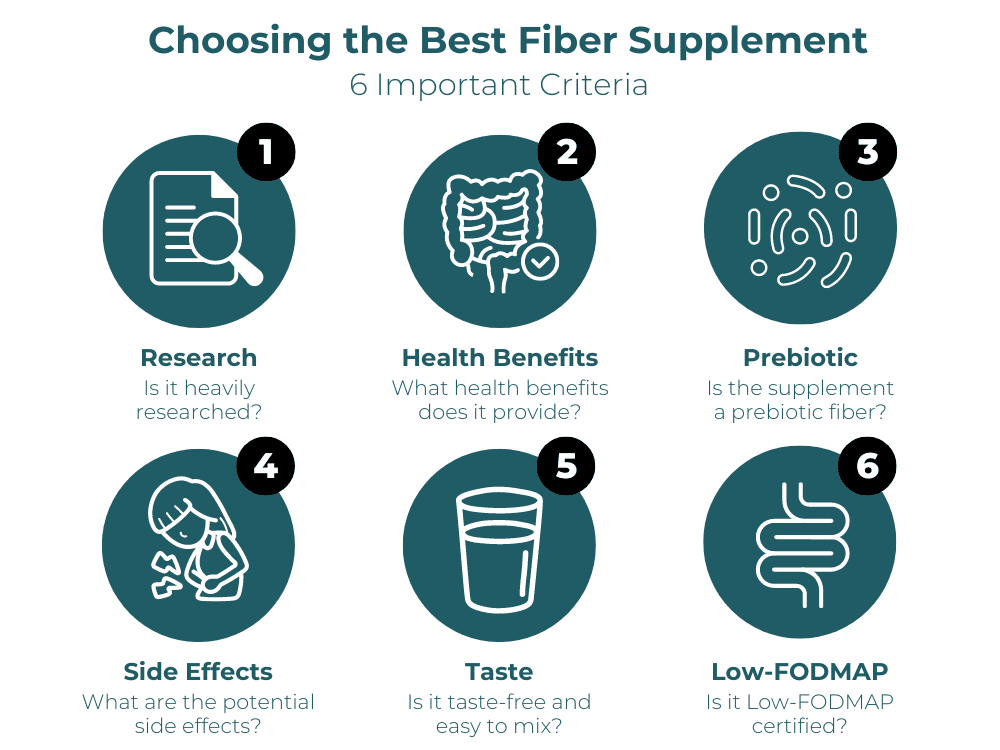The Best Fiber Supplements of 2024

✓ Expert Review by:
Derek Timm, PhD, RDN
Each year, millions of people try a fiber supplement to help with constipation, diarrhea or other health concerns. While the right fiber supplement can gently help you achieve regularity, some may not be well tolerated. They may cause you to experience such unpleasant side effects as additional gas, bloating and loose stools. Some powder fiber supplements also turn into a gloppy gel that may be challenging to consume.
Ultimately, the best fiber supplements of 2024 are those that are most likely to work well for you and your lifestyle. We’ve created this list of the most important factors to consider, to help you evaluate the active ingredients and benefits of the various fiber supplement brands.

Jump to Section
How to Choose a Fiber Supplement
There are a dizzying number of fiber supplements on the market, and not all fiber supplements are the same. To narrow your search, you’re smart to do your research. Consider such factors as the fiber’s source, any known side effects, the product’s purity and what the science says about its intended benefits.
Below are some of the most important things to consider when choosing a fiber supplement.

Is it Heavily Researched?
Since there are many different types of fiber supplements, choosing one that has been used extensively in research studies is very important to confirm its safety and efficacy. In fact, the more research a fiber has, the better!
What Health Benefits Does it Provide?
Look at the company’s claims, the research and the product reviews. What clinically substantiated health benefits does the supplement provide? This will help you determine the best fiber for constipation or overall wellness.
Not all products will have the same benefits, so consider your specific needs. What is the best fiber supplement for weight loss? Is there one that increases satiety so you’re not as hungry? Would you benefit from a fiber supplement that helps manage occasional diarrhea in addition to occasional constipation? If your desire is ongoing regularity, what is the best daily fiber supplement?
Other considerations: Is the fiber soluble or insoluble? Both are important to good health. The right soluble fiber aids digestion, feeds beneficial bacteria, moderates glucose absorption, lowers cholesterol and helps you feel less hungry (increases satiety). Just be careful. Some soluble fibers may lead to additional gas, bloating and worse: loose stools and diarrhea.
If you don’t see any mentions of your particular sought-after benefit, it might be best to check a different supplement.
Is it a Prebiotic Fiber?
The friendly bacteria in your gut need good nutrition to thrive. Prebiotic fiber supports digestive health by serving as food for the friendly bacteria (probiotics). This is why prebiotic fiber is responsible for many of the benefits people experience from increasing their fiber intake.
Important to note: Some prebiotic fibers, such as inulin, ferment more quickly in the gut than others. This may result in an excess of uncomfortable bloating and gas. This is why many people choose a prebiotic fiber with a slower fermentation rate.
What are the Potential Side Effects?
There’s little point to addressing one health concern if you’re just creating a new one for yourself. As mentioned above, many dietary fiber supplements are associated with uncomfortable side effects such as gas, bloating or abdominal discomfort.
The best fiber supplements are ones that consistently deliver the benefits with minimal side effects.
Is it Taste-Free?
Some fiber supplements can be challenging to take, especially on a regular basis. They may be difficult to mix completely in water, resulting in a gloppy or gritty consistency. Some may have an undesirable taste or mouth feel.
Choosing a product without any taste or aroma, and that doesn’t change the consistency of whatever it’s mixed with, gives you more freedom to use it in a variety of ways. Mixing ‘invisibly’ means it can easily be added to your normal meals and recipes without changing their taste, texture or aroma.
Is it Low-FODMAP Certified?
FODMAPs are a group of dietary carbohydrates which are poorly absorbed in the small intestine. They are known to cause gas-related pain, intestinal distention and constipation and/or diarrhea in people suffering from functional gastrointestinal disorders (FGIDs) and irritable bowel syndrome (IBS). Low-FODMAP diets help to reduce these symptoms.
Monash University Low FODMAP Certified™ fiber supplements make it easy to increase your fiber intake, even if you follow a low-FODMAP diet.
What are the benefits of fiber?
Studies have found a number of benefits of dietary fiber, including improving constipation or diarrhea, supporting digestive health, managing microflora balance, blood glucose control, reduction in cholesterol levels and assisting in weight management.
Best Fiber Supplements of 2024
The best fiber supplement will meet or exceed all of the deciding factors listed above. We recommend looking for products containing Sunfiber. Some of the best fiber supplements with Sunfiber are listed here.
How to Know if You Need a Fiber Supplement
The Dietary Guidelines for Americans estimate that 97% of men and 90% of women don’t consume the recommended daily amount of fiber. Some signs of fiber insufficiency include constipation, flatulence, frequent upset stomach and hemorrhoids.
If you follow a gluten-free or low-FODMAP diet, you may be at an even greater risk for dietary fiber deficiency.
Daily Recommended Fiber Intake Suggestions
The recommended daily amount of fiber varies based on multiple factors, including age and gender. The most recent suggestions indicate adult men need 30-38 grams, and adult women need 21-28 grams.
To estimate your dietary fiber supplement needs, calculate the difference between your fiber intake from food and that of the recommended fiber intake for men and women.
Is fiber powder better than fiber pills?
Both powder and pills are fine for supplementing fiber. Pills often have lower doses per pill so consuming adequate amounts of fiber may require consuming several pills at a time. All else being equal, both should perform equally well if taken in the proper doses.
About Sunfiber
Sunfiber is a specific type of guar fiber that is found in a growing number of fiber supplements, and meets all the factors discussed above.
Sunfiber is a truly regulating dietary fiber that helps to normalize the digestive system without the side effects commonly associated with other types of fiber supplements. It is clinically shown to be effective at regulating occasional diarrhea and occasional constipation.
Sunfiber is an excellent prebiotic for supporting digestive health and microflora balance. It is tasteless, colorless, odorless, 100% gluten-free, low-FODMAP certified, and 100% water soluble. It is also Non-GMO Project Certified, Kosher, Halal, certified Glyphosate Residue Free, USDA Organic, vegan and Informed Ingredient certified.
Sunfiber is the world’s most-researched soluble fiber. It has been affirmed as GRAS (Generally Regarded As Safe) by an expert panel at a level up to 60 grams per day and is approved as a fiber source by Health Canada and other countries.
Available in a tasteless powder that can be used in cooking, Sunfiber is safe for use by people of all ages.
Learn More About the Best Fiber Supplements
Recap: The Best Fiber Supplements of 2024
We have outlined some of the biggest factors you should consider when deciding on a fiber supplement. These criteria include:
- Heavily researched
- Delivers the desired benefits
- Minimal side effects
- Prebiotic
- Easy to use and taste-free
- Natural and non-GMO
- Low-FODMAP



